
-
Trouvez la nourriture adaptée à votre animal de compagnieRépondez à ce quiz pour découvrir quelle alimentation conviendrait le mieux à votre compagnon à quatre pattes.Trouvez la nourriture adaptée à votre animal de compagnieRépondez à ce quiz pour découvrir quelle alimentation conviendrait le mieux à votre compagnon à quatre pattes.Produits recommandés
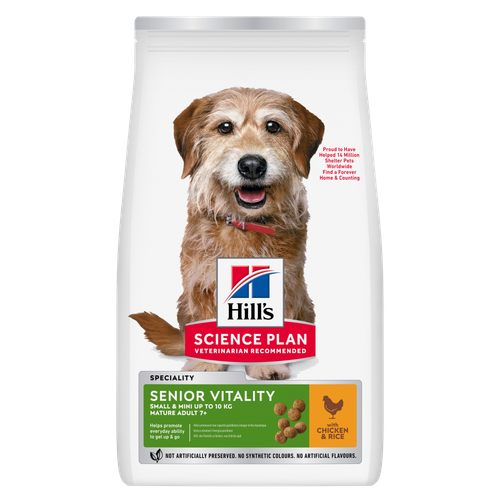 Senior Vitality - Croquettes pour Chien Mature (7+) - Petite Race - au Poulet et Riz
Senior Vitality - Croquettes pour Chien Mature (7+) - Petite Race - au Poulet et RizHill’s Science Plan Senior Vitality - Croquettes pour Chien au Poulet - Petite et très Petite Race Notre formule révolutionnaire favorise la capacité quotidienne de votre chien senior à se lever et à bouger.
Shop Now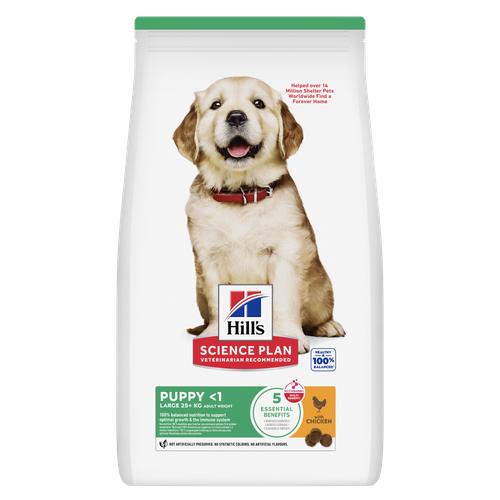 Puppy - Croquettes pour Chiot - Grande Race
Puppy - Croquettes pour Chiot - Grande RaceHill’s Science Plan Puppy - Croquettes pour Chiot au Poulet - Grande Race est un aliment complet spécialement formulé avec la technologie ActivBiome+ Multi-Benefit.
Aliment équilibré pour renforcer le système immunitaire et assurer une croissance optimale.Shop Now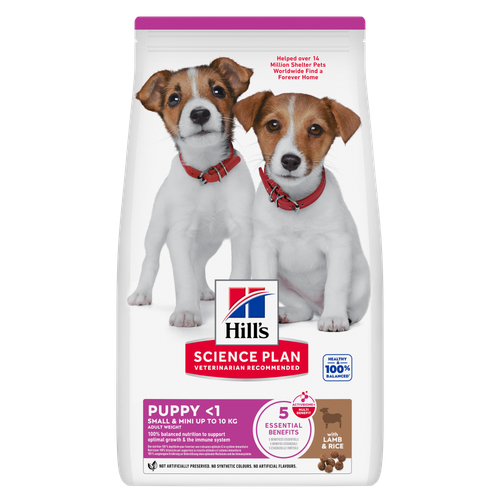 Puppy Small & Mini - Croquettes pour Chiot - Petite et très Petite Race
Puppy Small & Mini - Croquettes pour Chiot - Petite et très Petite RaceHill’s Science Plan Puppy Small & Mini - Croquettes pour Chiot à l’Agneau & Riz - Petite et très Petite Race est un aliment complet spécialement formulé avec la technologie ActivBiome+ Multi-Benefit.
Aliment équilibré pour renforcer le système immunitaire et assurer une croissance optimale.Shop NowProduits recommandés Hairball & Perfect Coat - Croquettes pour Chat Adulte - au Poulet
Hairball & Perfect Coat - Croquettes pour Chat Adulte - au PouletHill's Science Plan Hairball & Perfect Coat - Croquettes pour Chat Adulte - au Poulet a été formulé pour aider efficacement à éviter la formation de boules de poils chez le chat adulte tout en favorisant un beau pelage. Grâce à son mélange d’acides gras essentiels Oméga-6, cet aliment est bénéfique pour la peau et le pelage du chat, les maintenant sains et brillants. Notre technologie Advanced Fibre aide à réduire les boules de poils en favorisant naturellement leur passage dans l’intestin. Cet aliment est formulé avec des protéines de haute qualité pour une recette parfaitement équilibrée et savoureuse.
Shop Now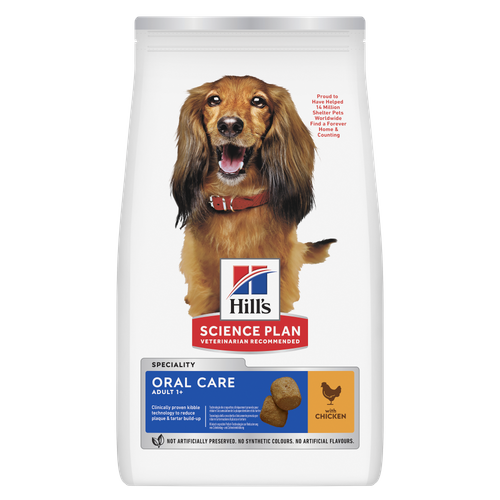 Oral Care - Croquettes pour Chat Adulte (1+)
Oral Care - Croquettes pour Chat Adulte (1+)Hill’s Science Plan - Oral Care - Croquettes pour Chat Adulte au Poulet sont des croquettes cliniquement prouvées pour réduire l’accumulation de plaque dentaire et de tartre.
Shop Now Sensitive Stomach & Skin - Sachet Repas pour Chat
Sensitive Stomach & Skin - Sachet Repas pour ChatHill’s Science Plan Sensitive Stomach & Skin Sachet Repas pour Chat Adulte à la Dinde est un aliment complet pour les chats adultes âgés de 1 à 6 ans. Cette alimentation hautement digestible se présente en sachet repas et favorise une meilleure digestion, nourrit la peau et rend le pelage épais et brillant.
Shop Now -
Pour chienPour chatArticles à la une
 Les bonnes résolutions pour la nouvelle année avec votre animal | Hill's Pet
Les bonnes résolutions pour la nouvelle année avec votre animal | Hill's PetÀ la fin de l'année, de nombreuses personnes fête la nouvelle année en créant une liste de nouvelles habitudes à adopter (ou à abandonner !) pour améliorer leur santé et leur bonheur.
Read More Idées de jeux pour les enfants et les animaux cet été
Idées de jeux pour les enfants et les animaux cet étéLes activités d’été en plein air avec votre chien ou chat peuvent être tout aussi divertissantes pour les enfants. Découvrez comment ces activités leur enseignent le sens des responsabilités et les aident à créer des liens avec leurs animaux.
Read More Fêtez la nouvelle année avec ces résolutions pour vos animaux
Fêtez la nouvelle année avec ces résolutions pour vos animauxÀ la fin de l'année, de nombreuses personnes fête la nouvelle année en créant une liste de nouvelles habitudes à adopter (ou à abandonner !) pour améliorer leur santé et leur bonheur.
Read More -


Puppy first aid
Hopefully your puppy will never seriously hurt himself but, being the high energy bundle that he is, he's bound to get into a few scrapes now and then and it's useful to have knowledge of basic first aid.
First Aid Box
You should always keep a few basic items on hand for emergencies, such as: cotton bandages, cotton wool or lint to clean wounds, mild pet-friendly antiseptic to wash wounds and a pair of tweezers for removing stings or objects from the mouth.
Bones, Sticks, Balls
Bones, sticks and balls can get lodged in or across the roof of a dog's mouth. If this happens, you may notice your dog pawing at his mouth, or he may find it difficult to close his jaws. You might be able to remove the object by hand or with tweezers, but if not, you'll need to get your vet to do it. He or she will use sedation to make removal easier. As always, prevention is better than cure, so never let your dog play with small balls and avoid throwing sticks.
Burns
If your puppy gets burned by hot water, oil, chemicals or ice, he'll need immediate attention. Minor burns can be treated at home - clean the affected area with a mild antiseptic and apply a soothing cream or gel such as aloe vera. Severe burns will need veterinary attention, so take your puppy to the vet straight away.
Cuts and wounds
Puppies may suffer from cuts or wounds particularly to their feet if they run on something sharp like broken glass. Clean the affected area with as dilute disinfectant such as Hibiscrub and apply a bandage if necessary. Consult your vet if you cannot stop the bleeding or the wound is severe.
Dog bites
If your puppy is unlucky enough to be bitten by another dog, it's always worth getting him checked over by the vet. Make a routine appointment if the bite or bites are minor and make sure your pet is seen as an emergency if they're severe.
Ear Problems
Your puppy's ears should be shiny, pale pink inside and free from wax or discharge. They should not smell unpleasant.
All ear problems require the attention of a vet.
Eye problems
If your puppy has any problems with his eyes such as a scratch or conjunctivitis, you should see your vet. Try to stop your puppy rubbing his eye if you can.


Conseils savoureux
Les chiots peuvent nécessiter plusieurs visites de vaccination au cours de leur première année. Les chiens adultes bénéficient généralement d'un contrôle annuel, tandis que les chiens âgés ou ayant des besoins spécifiques peuvent nécessiter des visites plus fréquentes.
Fits
A fit can be recognized by sudden, uncontrolled, spasmodic movements, often with champing of the jaw, and salivating. A fitting dog will usually fall onto its side and not be aware of its surroundings.
If your puppy does have a fit, don't try to restrain him. Instead, try to remove any furniture or hard objects around him he could hurt himself on. Turn off all stimuli such as lights, radio, television, washing machine etc, and darken the room so he can recover quietly.
You should always consult your vet if your puppy has a fit.
Fractured or pulled-off claws
These can be very painful and tend to quickly become infected. Bleeding is often profuse. If possible try to apply a bandage to the foot and then take your puppy to the vet as antibiotics are often required and the claw may sometimes need to be clipped back under sedation or anaesthetic .
Heat Stroke
The best advice as far as heat stroke is concerned is that prevention is better than cure. Make sure your puppy doesn't stay out in the sun for too long on hot days and that he's not out in the midday heat.
If, despite your best efforts, he does get mild heatstroke, cool him down as best you can with wet towels or a fan, get him to drink plenty of cool water and make sure he gets lots of rest.
Serious heatstroke will require the attention of a vet.
Lameness
If your puppy is obviously in pain and can't put any weight on his leg you should take him to the vet immediately to rule out the possibility of a fracture.
In less severe cases, check the pad for thorns, embedded grit or cuts and look for damaged nails.
Poisoning
Puppies are very inquisitive and there's always the possibility your puppy will get hold of something he shouldn't. Like heatstroke , prevention is better than cure and you need to puppy proof your home and garden to ensure he can't get at things that could be harmful like slug pellets, bleach or human chocolate. If you suspect that you pet has digested something he shouldn't have done then always bring the packaging to your vet as this will help them identify the problem and source an antidote.
If the worst does happen, see your vet as an emergency.
Road Traffic Accidents
If your puppy has been involved in an accident, you should call your vet straight away. Your puppy may be in shock and could react unpredictably. So approach him slowly and carefully. If possible, lift your dog onto a blanket (or use the mat from the car foot well), then get him to the vet as quickly as you can. If he cannot be moved, you may have to ask your vet to visit the scene.
Stings and insect bites
If your puppy has severe swelling around his mouth, nose or throat that could cause breathing difficulties due to a sting , you should get him to the vet's immediately.
If the sting or bite isn't causing any serious problems, you can alleviate your puppy's discomfort by applying a cold compress to the affected area.


L'un de nos auteurs a préparé cet article pour vous
Produits Similaires
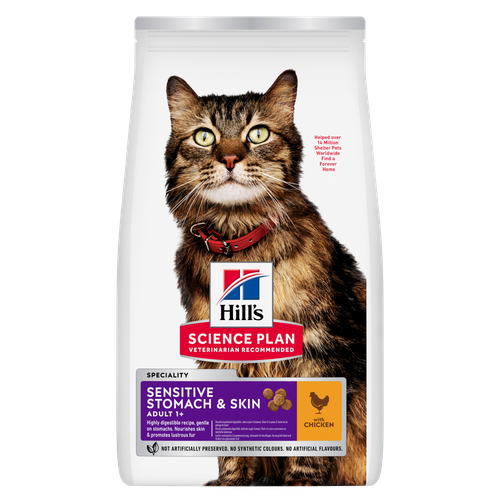
Hill’s Science Plan - Sensitive Stomach & Skin - Croquettes pour Chien - Moyenne et Grande Race au Poulet est un aliment complet favorisant la santé digestive et cutanée du chien adulte.

Hill’s Science Plan Sensitive Stomach & Skin Pâtée pour Chien Adulte au Poulet est un aliment complet pour les chiens adultes âgés de 1 à 6 ans. Cette délicieuse pâtée est enrichie en ingrédients qui favorisent la santé digestive et cutanée.
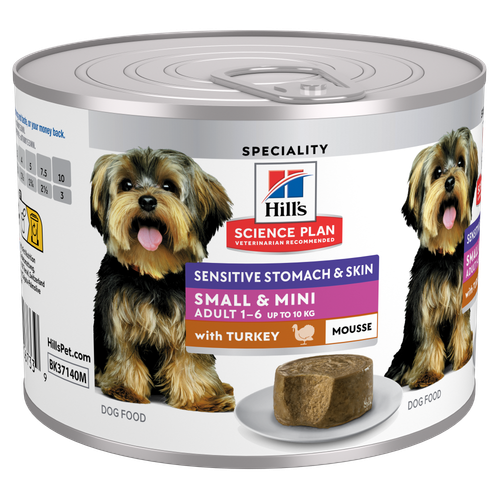
Hill’s Science Plan Sensitive Stomach & Skin Mousse pour Chien Adulte à la Dinde - Petite et très Petite Race est un aliment complet qui se présente sous forme d’une délicieuse mousse fondante formulée pour les chiens adultes de petites races âgés de 1 à 6 ans. Cet aliment facile à digérer favorise une digestion saine, nourrit la peau et rend le pelage épais et brillant.
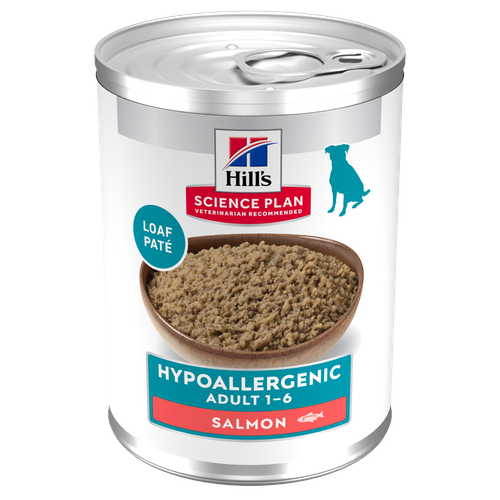
Hill's Science Plan Hypoallergenic - Pâtée pour Chien Adulte au Saumon est un aliment complet pour les chiens adultes âgés de 1 à 6 ans. Formulé pour les chiens à la peau et l'estomac délicats, avec un nombre limité de sources de protéines nouvelles de haute qualité et sans céréales.
Articles Similaires

Découvrez des informations essentielles sur les soins à apporter aux chiens nains et leurs besoins spécifiques. Pour des conseils complets sur les races naines et la santé du chien, consultez le site Hill's Pet FR.
Découvrez les causes, les signes et les traitements de l’insuffisance rénale chez le chien ainsi que des méthodes pour soutenir la santé rénale de votre chien. En savoir plus sur Hill’s Pet FR.

Si vous avez un chien ou que vous envisagez d’en adopter un, vous avez sûrement entendu de nombreux conseils de spécialistes sur le dressage, que ce soit dans des livres, des magazines ou des émissions télévisées.

Découvrez des astuces efficaces pour nettoyer les dents de votre chien ainsi que des conseils généraux pour préserver sa santé dentaire. Consultez le site Hill’s Pet FR pour obtenir des conseils d’experts.

Mettez votre chien au régime sans qu'il le sache
Notre formule hypocalorique vous aide à contrôler le poids de votre chien. Riche en protéines de haute qualité pour développer une masse musculaire maigre, elle est élaborée avec des ingrédients ciblés pour un repas savoureux et nutritif. Des antioxydants cliniquement prouvés, comme les vitamines C et E, contribuent au bon fonctionnement du système immunitaire.
Mettez votre chien au régime sans qu'il le sache
Notre formule hypocalorique vous aide à contrôler le poids de votre chien. Riche en protéines de haute qualité pour développer une masse musculaire maigre, elle est élaborée avec des ingrédients ciblés pour un repas savoureux et nutritif. Des antioxydants cliniquement prouvés, comme les vitamines C et E, contribuent au bon fonctionnement du système immunitaire.

